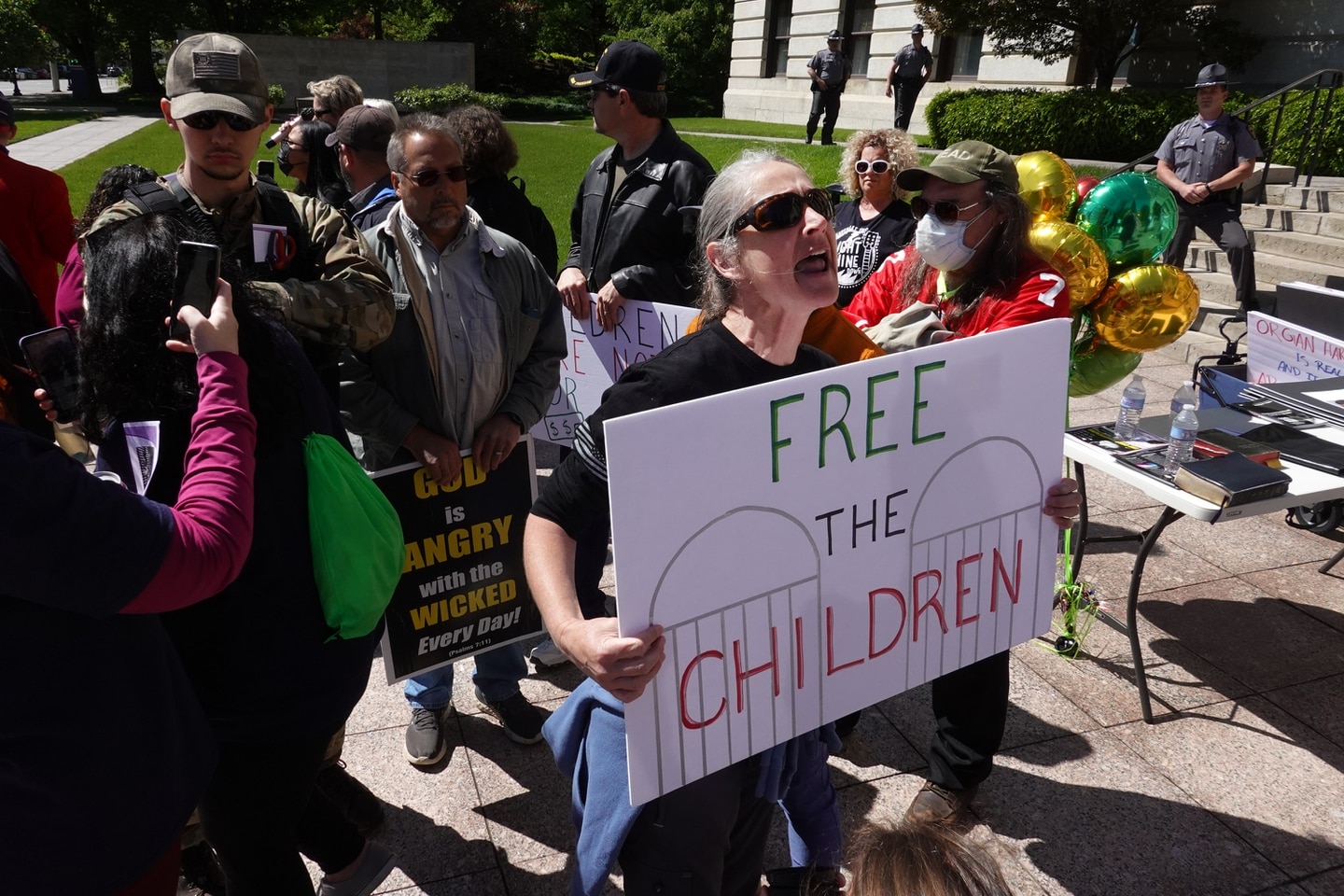QAnon candidates are on the ballot in 26 states
Part one of “The United States of QAnon,” an occasional series examining the QAnon movement’s influence in American politics.
Dozens of politicians running for state or federal office are aligning themselves with the right-wing, conspiracy-rich, sometimes-violent movement known as QAnon. They’re drawing tens of millions of dollars in donations as the movement’s popularity stays strong among voters, a Grid investigation has found.
And despite the movement’s penchant for lies and violence, key Republicans — from influential megadonors to prominent elected officials — are welcoming the QAnon movement into the party, Grid found. In sum: QAnon appears to be a growing political movement with increasing clout and significant mainstream appeal.
Grid reviewed public records and reporting, social media posts, and campaign materials and events to identify and confirm at least 78 QAnon-aligned candidates running for office in 26 states in 2022. They’re running for governorships, secretaries of state, seats in the Senate and House, and in state legislatures. They have raised over $20 million this cycle — and over $30 million since 2018.
All but six of the QAnon-aligned candidates Grid examined are Republican. Over a dozen are incumbents: Marjorie Taylor Greene (R-Ga.) and Lauren Boebert (R-Colo.) serve in the House of Representatives, while another 14 serve at the state level, mostly legislatures. Most are running against fellow Republicans in primaries, which will take place throughout the spring and summer.
Arizona has the highest number of QAnon-aligned candidates running in 2022, at 13. Other states with high numbers of QAnon candidates include Florida (12), California (10) and Texas (six).
“You will win by large margins”
While some Republican elites were circumspect about aligning themselves explicitly with the movement, their reluctance has ebbed as the popularity of QAnon’s theories have grown.
QAnon candidates receive support from GOP megadonors like Home Depot co-founder Bernard Marcus, casino mogul Steve Wynn and San Francisco Giants owner Charles Johnson, as well as from party-affiliated fundraising machines. They have enjoyed exposure on right-wing outlets from Fox News to OANN. The movement’s causes and themes are echoed by prominent elected officials like Republican Sens. Ted Cruz (Texas) and Lindsey Graham (S.C.), and by former president Donald Trump himself.
ADVERTISEMENT
Which raises a related riddle: What to call the influx of QAnon messages and candidates into the political mainstream? The movement has no apparent party structure or central organization, yet it appears stronger than any third party. The community doesn’t appear to have a candidate recruitment strategy but fielded dozens of federal and state candidates in over half of U.S. states this cycle.
QAnon emerged in 2017 on anonymous, fringe internet message boards. It has grown into a major online disinformation source, driven by a far-right internet-based community that believes violence can be necessary to achieve political ends — and that an elite cabal of blood-drinking pedophiles runs the world. The beliefs the QAnon community propagates are sometimes antisemitic and xenophobic.

QAnon was a major driver of election fraud myths in the wake of Trump’s electoral loss in 2020. In January 2021, it helped inspire hundreds to attack the Capitol. This year, it helped sustain convoy protest efforts in Canada and the United States. The FBI has warned it may well inspire more bloodshed and criminality.
In June 2021, one of the most popular QAnon influencers, “GhostEzra,” asked followers of his Telegram channel to run for political office in a post rife with offensive language.
“Folks listen up closely. We need some honest, non Zionist, non tranny’s [sic] running for Congress in 2022,” the post on the Telegram app stated. “The bar is low, you don’t even need to have all your teeth. You will win by large margins too.”
ADVERTISEMENT
Few QAnon candidates examined by Grid had significant political accomplishments to their name. Several participated in the “Stop the Steal” rallies preceding the Jan. 6 insurrection or were near the Capitol during the insurrection itself. One, Arizona State Rep. Mark Finchem (R), has been subpoenaed by the House Jan. 6 committee.
Finchem has called the committee a “Kangaroo Court” and told the right-wing Gateway Pundit site that “the fact that Liz Cheney and Nancy Pelosi both are coming after me, tells me I’m right over the target.”
The QAnonian candidates
Predicting the electoral success of the QAnon candidates is difficult. Some are prodigious fundraisers and gifted communicators; many others struggle from meager budgets and minimal social media audiences. But history is clear: Losing once in politics does not make a candidate, or their cause, a loser.
Arizona State Sen. Wendy Rogers, a QAnon-affiliated Republican, is a case in point: Rogers ran and lost five times before winning the state legislative seat she now defends. Rogers did not respond to requests for comment.
Grid built its list of QAnon-aligned candidates by identifying common QAnon terms from online groups; studying the public record, including signal research done by Alex Kaplan, a senior researcher at the liberal watchdog group Media Matters for America; and searching public media accounts and campaign materials of state and federal candidates, to identify obvious references to QAnon. This could include following and sharing content from QAnon influencers, or using the term “QAnon” or hashtags unique to the QAnon movement, like #WWG1WGA, an acronym for the group’s motto: Where we go one, we go all. We also looked for candidates’ appearances at explicitly QAnon-themed events.
ADVERTISEMENT
We evaluated the information we had on each candidate, selected those who appeared obviously identifying with QAnon in their public personae and reached out to them for comment. Finally, we evaluated any candidates’ responses received against the information we had. We disregarded a number of candidates after they replied with what appeared to be plausible claims of ignorance; for instance, one said he did not know the meaning of the memes he retweeted.
Many of the candidates associated with QAnon come from large, populous states in the South and Sun Belt — places that are also experiencing growth and demographic shifts from within and outside the United States. Natalie Jackson, research director for the Public Religion Research Institute (PRRI), said that the kind of culture-war issues that are so popular within QAnon may correlate to regions with fast-changing demographics.
“In general, what we’re seeing across lots of different topics, not just QAnon, is where the demographic movement is happening the most, we’re seeing the culture war-type issues get stirred up,” she said.

Several of the candidates had been suspended from Twitter. If as a group they are remarkable for something beyond the surprising influence of the movement to which they have affiliated themselves, it is the frequency with which they find themselves censured, rebuked, deplatformed or under investigation.
That’s no knock to them; it can be a badge of honor. After the Arizona State Senate censured Rogers in March for her violent speech before white nationalists, for example, she used that scorn as a basis for a fundraising appeal. Rogers, the four-time loser, has raised nearly $2.5 million this cycle, more than virtually any other statewide Arizona candidate.
ADVERTISEMENT
QAnon-linked political candidacies in 2022 range from well-funded, high-profile operations like Rogers’ — with at least five (including Rogers’) endorsed by Trump — to low-budget efforts that attract little attention. Indeed, many QAnon candidates look like long shots. But the history of QAnon is one of consistently surprising mainstream experts.
Consider Edward Durr, a New Jersey State Senate candidate who attracted little notice during the state’s 2021 elections. A commercial truck driver, he tweeted in 2020 using the QAnon acronym WWG1WGA. In other posts, Durr called the Prophet Muhammad and Sen. Robert Menendez (D-N.J.) pedophiles, and compared vaccination mandates to the Holocaust, NJ.com reported.
Durr spent just $2,300 on his campaign to unseat Democratic State Sen. Steve Sweeney, who was both the president of the Senate and its longest-serving member. Against expectations, Durr won. Durr did not return requests for comment.
Vote Q in 2022?
In fact, Q himself may be on the ballot this year. Ron Watkins, a computer programmer who administers the 8kun imageboard website where QAnon originated, is running a long-shot bid for Congress in Arizona’s 2nd Congressional District.
Watkins is widely believed to have authored some of the internet posts under the “Q” pseudonym that helped create the movement. Watkins has said he would raise $1 million, but so far has raised roughly $50,000. Last month, the Federal Election Commission asked Watkins to clarify the source of more than $20,000 of his campaign’s fundraising. Watkins did not respond to requests for comment sent to his campaign.
ADVERTISEMENT
Other candidates linked to QAnon range from Massachusetts gubernatorial candidate Shiva Ayyadurai, who has four degrees from MIT and a website defending his status as the inventor of email, to Ryan Dark White, a U.S. Senate candidate in Maryland who goes by Dr. Jonathan Ambrose McGreevey and pleaded guilty to fraudulently obtaining more than 80,000 doses of opioids and illegally owning guns. Neither Ayyadurai nor White responded to Grid’s requests for comment.
While some QAnon-linked candidates entered politics first and discovered the QAnon movement along the way, there are indications that QAnon-connected candidates are rising organically from the corners of the web where the movement’s adherents congregate.
In response to the call from the QAnon influencer GhostEzra, an account appearing to identify itself with Arizona and bearing the username “Anna Orth” answered the call. “I’ll run for something,” the Anna Orth account replied. “City council, House rep?”
An Anna Orth subsequently filed to run for a seat in the Arizona House of Representatives. The candidate said in an email responding to questions from Grid that she did not write the post attributed to her Telegram account, but that she was a fan of the GhostEzra Telegram group.
“As far as I know, there is no such thing as QAnon,” she wrote. “I enjoy reading about ALL things, fact, and fiction, on Telegram, including GhostEzra. … GhostExra posts offer very interesting and entertaining content but has had NO bearing on my decision to run for office.”
ADVERTISEMENT
GOP funders open their wallets
Federal candidates associated with QAnon have raised nearly $25 million in the last two election cycles. Most of the total came from small-dollar donations, according to a Grid analysis of FEC records, signaling grassroots support for the candidates’ messages.
The vast majority of the donations — about $17 million — went to Greene and Boebert. They are perhaps the two highest-ranking incumbents associated with the QAnon movement, though both have over the years made comments distancing themselves from previous statements suggesting support or belief in QAnon. A Boebert spokesperson responded to questions from Grid by pointing to a June 2020 tweet from Boebert saying, “QAnon = Fake News,” and that she is “Not a follower.” Greene’s office did not respond to requests for comment.
For the most part, the GOP’s deepest pockets don’t seem to flinch at candidates’ QAnon allegiances. A study by the Washington, D.C.-based nonprofit Moonlight Foundation identified 15 major Republican donors who have thrown substantial funding to QAnon-aligned candidates. The organization researches the people and entities who spread misinformation.
Wealthy QAnon supporters identified by the group include Roberta and Tatnall Hillman, who gave at least $90,000 to eight QAnon candidates this cycle — a sliver of their overall giving, which favored Trump-friendly candidates and causes. Johnson, the billionaire Giants owner, has written checks to QAnon candidates Carla Spalding of Florida and Boebert, after publicly distancing himself from QAnon and Boebert following the Jan. 6 insurrection.
“Like most of the country, I watched in dismay as our Capitol was overrun last week,” Johnson said in a statement days after the 2021 attack. “I would never have imagined that any legitimate candidate would participate in undermining the core values of our great country. Nor was I aware that any candidate to whom I contributed was associated with QAnon.”
ADVERTISEMENT
Other mainstream GOP donors, including Wynn and Marcus, have also supported candidates with QAnon ties, according to the Moonlight Foundation report. Neither Hillman, Wynn, Johnson nor Marcus responded with comment to Grid’s inquiries.
While Greene and Boebert top the list of QAnon candidates’ fundraising, the 28 other congressional candidates who have associated themselves with the movement have shown some fundraising ability this cycle, raising on average about $150,000, the Grid analysis shows.
Others have pledged to mount campaigns but failed to file appropriate paperwork or to raise funds.
One candidate keeping pace with other congressional campaigns financially is Spalding, a Navy veteran and Jamaican-born candidate in the Republican primary in Florida vying for a chance to face off against incumbent Debbie Wasserman Schultz of south Florida, a senior figure among House Democrats. Spalding has raised $1 million — some in the form of some big checks from major donors like Johnson and his wife, but much of it in small donations.
Spalding first connected with the movement in 2018 with a tweet, which included a popular QAnon hashtag. It has since been deleted.
Spalding repeatedly appeared on the YouTube show of QAnon influencer Cirsten Weldon, where they have referred to each other as friends. In one episode, Weldon asks Spalding how many QAnon accounts were removed from Twitter, who confirms a total of 150,000. Weldon, who was a prolific spreader of vaccine conspiracies, died earlier this year after contracting covid-19.
In an interview with Grid, Spalding said she didn’t believe in the core tenets of QAnon: An elite cabal of Satan-worshiping pedophiles runs the world, “a storm is coming” soon to remove elites in power and restore rightful leadership, and American patriots may need to resort to violence to save the country.
“I don’t really know much about that, other than what I’ve seen on Twitter,” said Spalding.
What’s old is new again
Much of QAnon’s fabulist narrative is cobbled together from older conspiracy theories and racist narratives that already claimed adherents, including antisemitic “blood libel” tropes that have been around for centuries.
In fact, there has long been a careful relationship between mainstream Republican politics and its outermost conspiratorial fringes, said David Hopkins, a political scientist at Boston College who researches American political parties and voting behavior.
“There’s an element of conservatism at its mass level that has often been attracted to conspiracy theories,” he said. “Conservative politicians, whether or not they personally believe in those theories, have often faced what they think of as a certain amount of pressure to at least accommodate or play to the conspiracy-minded popular right.”
Some experts believe the cultural relevance of this decentralized community stems in part from its ability to recycle older xenophobic conspiracy theories even as it spins new ones. But that shouldn’t distract from one of the QAnon movement’s greatest strengths: its uncanny knack for brewing up galvanizing, if ludicrous, narratives for today’s audiences.
Meanwhile, the Republican Party has lurched further to the extreme right, experts told Grid, where inspiration for many of these narratives emerges. The result is a broad overlap of familiarity and opportunity: a mainstream party accustomed to accommodating a conspiratorial fringe, and a fringe movement that’s gifted at delivering viral, right-friendly narratives into the mainstream.
“The party has, in many ways, moved beyond what we think of as traditional conservative policies,” said Will Sommer, a politics reporter who has written a forthcoming book about QAnon. “Certainly, I think people in Congress still want to cut taxes. But that doesn’t really seem to get a lot of the grassroots riled up.”
Experts also noted that the structure of American electoral politics incentivizes mainstream Republicans to entertain fringe beliefs. Many politicians are more at risk of losing their seat during a primary race against a fellow party member than in a general election, Hopkins explained, so often Republicans align themselves with a broad base of conservative voters to achieve their political ambitions.
“There’s often been a lot of worry about not wanting to distance yourself or disavow even conspiratorial thinking on the right, because it would somehow send a message to conservative voters that you’re not really a part of the conservative cause,” he said. “So often Republican candidates are vague about what they believe and how far their sympathies go.”
Last month, GOP senators echoed the Q theme of elite cadres of Democrats trafficking children during the recent Supreme Court justice confirmation hearings; in Florida, debate over the state’s so-called Don’t Say Gay law rang with Republican charges that the law’s opponents were trying to “groom” Florida’s children for sexual abuse. Fox News host Laura Ingraham suggested that public schools are becoming “what are essentially grooming centers for gender identity radicals.”
“There’s very little that differentiates what [QAnon believers] talk about from what just Republicans are talking about now,” said Mike Rothschild, an expert on conspiracy theory movements who has been following QAnon for years. “What we’re really seeing is the mainstreaming of Q’s mythology of an all-powerful ‘deep state’ and a secret war between good and evil.”
A resilient movement
When Trump was eventually forced from power by the constitutional apparatus he fought to subvert, many predicted the demise of QAnon. The event shattered a central component of the initial Q myth, which held Trump would remain in power.
It seemed then like the popular tide had turned against QAnon. Social media platforms were already cracking down on the movement: Reddit had banned QAnon communities in 2018, and in the fall of 2020, Facebook announced a ban on all QAnon accounts, although it was reportedly not swift in implementing the measure. Following the Capitol attack, Twitter suspended tens of thousands of QAnon-related accounts. By spring of 2021, Twitter said it had suspended some 150,000 accounts for tweeting QAnon misinformation.
Many expected the crackdowns to disperse the Q communities that congregated on those platforms. Instead, the communities moved to alternative platforms with light content moderation, like Telegram, where devotees continue to formulate and share intricate and grotesque conspiracy theories.
Who is the QAnon voter?
Polling on QAnon has been a fraught proposition because the movement is so decentralized and asking Americans whether they believe in “QAnon” directly might produce limited results. One poll by Yahoo News in 2020, for example, found that just 7 percent of Americans believe in the movement. Those figures rise when asking whether respondents’ latent beliefs align with the movement’s core tenets, however.
One such approach, by the nonprofit PRRI, asked survey respondents in four polls last year whether they agreed with three statements associated with the movement: whether “the government, media, and financial worlds in the U.S. are controlled by a group of Satan-worshiping pedophiles”; whether they believe there’s a “storm coming” to “sweep away elites in power”; or whether “patriots may have to resort to violence” to “save our country.”
By that measure, the results show that about 15 percent of Americans either completely or mostly agree with those core tenets, suggesting there’s a broad appetite for Q-related conspiracies, said Jackson, the institute’s research director.
“Everyone who falls into our label of ‘QAnon’ believer is not going to say, ‘Oh, yes, I’m a QAnon believer.’ They may not even know what it is. But they are willing to buy into the things that QAnon is putting out there. That makes them, whether they realize it or not, a QAnon believer,” she said.
PRRI found Americans who trust far-right news outlets such as One America News Network and Newsmax were nearly five times as likely to be QAnon believers as those who trust mainstream news. Roughly 25 percent of Republicans agreed with the questions asked by the institute, while only 9 percent of Democrats agreed.

The political implications of this group — some 50 million people, a size that Jackson said was equivalent in size to the U.S. white evangelical population — continue to be felt, as evidenced by the increased chatter among some in Washington about child exploitation during the Supreme Court confirmation hearings for Ketanji Brown Jackson.
Just last week, Greene tweeted that anyone voting for Jackson is “pro-pedophile.”
“We’re seeing these themes burst even more onto the Republican mainstream,” PRRI’s Jackson said. “From a very practical standpoint, you can see the imprint it’s having on politics.”
Jason Paladino and Anna Deen contributed to this story. Thanks to Lillian Barkley for copy editing this article.


